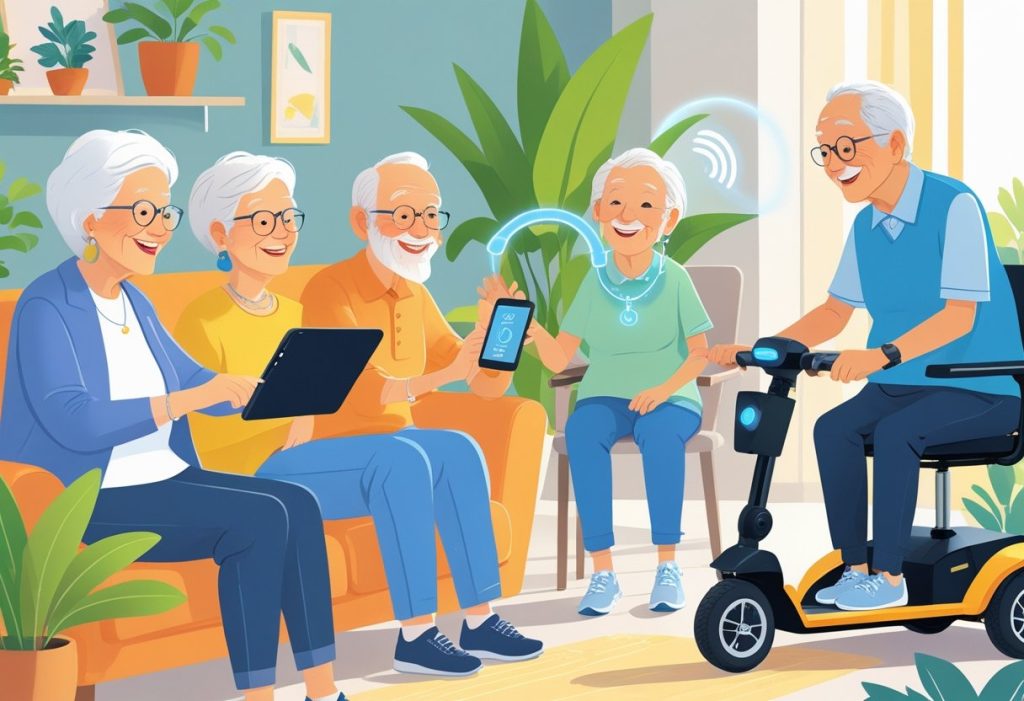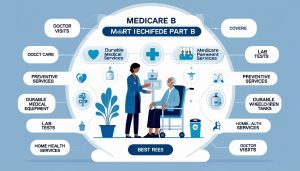As you navigate the challenges of aging, assistive technology offers essential tools that can enhance your quality of life. These technologies range from simple devices, like hearing aids, to more advanced systems, such as smart home devices, all designed to promote independence and safety for seniors. Understanding the various types of assistive technology available can empower you to make informed decisions that suit your specific needs.
At The Modern Medicare Agency, we recognize the importance of these technologies in your daily life. Our licensed agents work closely with you to identify Medicare packages that support your access to necessary assistive devices. We focus on finding solutions that not only meet your healthcare needs but also fit your budget, ensuring you receive the best possible care without unexpected costs.
Embracing assistive technology can transform how you experience your environment, helping you stay connected, mobile, and secure. With the right support, you can make the most of these innovations, enhancing your independence as you age.
Understanding Assistive Technology for Seniors
Assistive technology encompasses a range of tools and devices that enhance the daily lives of older adults. These technologies play a crucial role in promoting independence and improving overall quality of life.
Definition and Scope
Assistive technology (AT) refers to various devices designed to assist individuals with disabilities or age-related limitations. Examples include mobility aids like walkers and wheelchairs, communication devices, and home automation systems.
The scope of AT spans multiple types, including:
- Mobility aids: Helps with movement and navigation.
- Communication tools: Enables easier conversation for those with speech impairments.
- Daily living aids: Simplifies tasks like meal preparation or medication management.
These technologies support seniors in their daily activities, fostering greater independence.
Importance for Independence and Quality of Life
Assistive technology significantly enhances quality of life by enabling seniors to age in place. You can maintain autonomy in your living environment, which contributes to peace of mind.
Studies show that the use of assistive devices leads to improved mental health outcomes by reducing feelings of isolation.
Some benefits of using AT include:
- Increased mobility, allowing you to engage in social activities.
- Enhanced communication, supporting connections with family and friends.
- Greater safety in daily tasks, minimizing the risk of accidents.
Choosing the right assistive technology can be empowering, helping you to maintain control over your life. For tailored Medicare insurance solutions that support your journey with assistive technology, consider The Modern Medicare Agency. Our licensed agents work one-on-one with you to find the best Medicare packages suited to your needs.
Common Types of Assistive Devices
Assistive devices play a crucial role in enhancing the quality of life for seniors. They support daily activities and improve mobility and communication, addressing various health concerns associated with aging.
Daily Living Aids
Daily living aids are essential tools designed to simplify routine tasks for seniors. These tools help with activities of daily living (ADLs), promoting independence. Examples include button hooks, which assist with fastening clothing, and sock aids that make putting on socks easier for those with limited flexibility.
Jar openers are invaluable for those with reduced grip strength, while reachers enable users to pick up items without straining. Zipper pulls help with clothing fasteners effortlessly. Safety is also a concern; grab bars installed in bathrooms provide support to prevent falls. Shower chairs and bed rails offer stability, ensuring safe maneuvering in potentially hazardous areas.
Mobility Supports
Mobility aids are vital for seniors experiencing poor balance or reduced range of motion. Devices designed to enhance mobility include mobility scooters, which allow for easier navigation and independence during outings. Chair lifts can assist in moving seniors from a seated to standing position safely.
Other examples are walking frames and canes, which provide the necessary support to help prevent falls. For individuals experiencing frailty syndrome, engaging with these devices can significantly boost confidence. Mobility aids are essential for maintaining an active lifestyle and promoting overall well-being.
Communication and Hearing Devices
Effective communication can be a challenge for seniors experiencing hearing loss. Hearing aids are prominent devices that amplify sound, improving the ability to engage in conversations. Alongside hearing aids, other communication devices exist, such as specialized phones with larger buttons and visual aids for clearer messaging.
For those with vision loss, screen readers can assist by converting text to speech, making technology more accessible. These devices enhance social engagement, reduce feelings of isolation, and enable seniors to maintain connections with family and friends.
Choosing the right assistive technology can significantly impact independence and quality of life. For guidance on your Medicare insurance coverage options, consider working with specialists at The Modern Medicare Agency. Our licensed agents provide tailored support without any extra fees, ensuring you find the best plan for your needs.
Smart Technologies and Safety Solutions
Smart technologies play a crucial role in enhancing safety and independence for seniors. By integrating various devices into daily life, you can ensure a safer living environment while maintaining independence.
Home Safety and Monitoring Systems
Home safety monitoring systems are essential for protecting seniors in their residences. Smart home devices, such as video doorbells and smart thermostats, allow you to monitor your home in real time.
These systems can send alerts if unusual activity is detected, helping to maintain security. Additionally, carbon monoxide detectors equipped with smart technology provide instant alerts to harmful gas levels, ensuring your safety. Regularly monitoring these devices enhances your peace of mind and allows for quick responses to emergencies.
Fall and Emergency Response Solutions
The risk of falls among seniors is significant, with many experiencing falls each year. Fall detection technology plays a vital role in addressing this issue by identifying falls promptly.
Emergency response systems, such as medical alert devices, offer immediate assistance at the push of a button. These devices are designed to connect you with help, ensuring rapid response during emergencies. The integration of these systems supports safety while allowing for independence, knowing help is always available.
Health and Remote Monitoring Devices
Health monitoring technologies are revolutionizing how seniors can manage their health. Devices like smartwatches can track vital signs, including heart rate and activity levels.
Remote health monitoring provides updates directly to healthcare providers, facilitating proactive care. This technology ensures that any health issues can be addressed promptly, significantly enhancing your quality of life. By integrating these smart health devices, you empower yourself to take control of your well-being while remaining in the comfort of your home.
Assistive Technology for Cognitive and Mental Health
Cognitive impairments and mental health challenges can significantly impact daily living for seniors. Various assistive technologies can help address these issues, enhancing quality of life and fostering independence.
Memory and Organization Tools
Memory aids are essential for seniors experiencing forgetfulness or cognitive decline. Tools like digital reminders on smartphones or tablets can alert you to important tasks, appointments, or medication times.
Simple calendars and planners serve as effective visual aids, helping you stay organized. Some apps specifically designed for seniors allow you to create to-do lists and set reminders.
For individuals facing more severe memory loss, such as those with dementia, picture-based systems can help. For example, labeling items around the house or using photo albums to trigger memories can support daily functioning.
These tools not only assist with memory retention but also provide reassurance and confidence in managing everyday responsibilities.
Combating Social Isolation and Mental Health Challenges
Social isolation is common among seniors, leading to feelings of loneliness and depression. Assistive technologies can play a critical role in combating these feelings.
Video calling applications allow you to stay connected with family and friends. These interactions can significantly improve your mental well-being and provide emotional support.
Additionally, online support groups offer platforms where you can share experiences and connect with others facing similar challenges, fostering a sense of community.
Interactive devices, like tablets with social apps, can encourage engagement through games or educational tasks, keeping your mind active while also providing social stimulation.
With the right tools, you can actively combat social isolation and enhance your mental health.
Special Considerations for Chronic Conditions
Managing assistive technology for seniors with chronic conditions often involves tailored approaches to meet specific needs. Understanding the unique requirements of conditions like arthritis, multiple sclerosis, and Parkinson’s disease can lead to better outcomes and enhanced quality of life.
Devices for Arthritis, Multiple Sclerosis, and Parkinson’s Disease
For seniors with arthritis, ergonomic devices are invaluable. Consider using grip utensils or jar openers that reduce strain on the hands. For those with multiple sclerosis, voice-activated assistants simplify tasks that may be challenging due to motor difficulties.
Parkinson’s disease can significantly impact daily activities. Weighted utensils and stabilizing devices can help minimize tremors during meals. Using smart home technology can enhance independence by allowing easy control of the environment through voice commands or touch screens.
Adapting to Vision and Hearing Impairments
Vision loss can greatly affect daily activities. Visual aids, such as magnifiers and large-print materials, assist with reading and navigation. Screen readers provide audio descriptions of visual content, allowing users to access information electronically.
For hearing impairments, consider communication devices like amplified phones and hearing aids. These tools enable clearer conversations and enhance engagement. Visual alert systems for doorbells or alarms ensure that important signals are noticed, maintaining safety and awareness in the home.
When looking for Medicare insurance solutions tailored to these needs, The Modern Medicare Agency stands out. Our licensed agents are dedicated to helping you find packages that align with your requirements without extra fees.
Evaluating, Choosing, and Funding Assistive Technology
When considering assistive technology for seniors, it’s crucial to assess specific needs and explore funding options. Strengthening independence can significantly enhance quality of life, and the right choices make all the difference.
Assessing Needs and Selecting the Right Devices
Start by identifying daily activities that may require assistance. Consider areas such as mobility, communication, and daily living tasks. Written assessments, discussions with family, or consultations with healthcare providers can clarify these needs.
Next, focus on the types of assistive devices that match those requirements. For instance, mobility aids like walkers or wheelchairs enhance physical movement, while communication tools assist those with speech difficulties.
List potential devices and their benefits, such as:
- Vocational Tools: Support employment opportunities by enhancing productivity.
- Learning Tools: Aid cognitive function and memory retention.
Evaluate features, accessibility, and ease of use before making a selection. Balancing function with comfort is essential to promote regular use and satisfaction.
Funding Sources and Support Programs
Financial considerations are vital when selecting assistive technology. Various options can help you cover costs, including Medicare, Medicaid, and private insurance plans. The Modern Medicare Agency can guide you through navigating these choices, helping you find the right coverage.
State and federal programs often assist in funding specific devices, such as mobility aids or adaptive technologies. Additionally, non-profit organizations may offer scarce resources for seniors seeking assistance.
Keep a list of potential funding sources and their eligibility requirements. This effort can streamline the application process and facilitate access to much-needed devices. Connecting with local support groups can also provide insights into available resources and additional assistance options.
Frequently Asked Questions
Navigating the world of assistive technology can raise important questions for seniors and their caregivers. This section addresses common inquiries regarding the devices available, their benefits, and considerations for choosing the right options for elderly care.
What devices can help improve daily living for elderly individuals at home?
Several devices significantly enhance daily living for seniors at home. Smart home technology, such as voice-activated assistants, allows for hands-free control of lights and appliances.
Mobility aids like walkers, canes, and stairlifts provide physical support. Additionally, medication management systems help ensure timely dosing, promoting health and safety.
Which assistive devices are most beneficial for seniors living alone?
For seniors living alone, devices that enhance safety and communication are vital. Personal emergency response systems (PERS) allow seniors to call for help with the push of a button.
Video doorbells enable communication without physical interaction. Smart fall detection systems can alert caregivers or emergency services when a fall occurs, ensuring timely assistance.
How does assistive technology contribute to the independence of older adults?
Assistive technology fosters independence by helping seniors manage daily tasks. Devices like robotic vacuum cleaners take over chores, allowing seniors to maintain a clean home without physical strain.
Adaptive utensils and enhanced hearing devices can assist in cooking and communication, enabling seniors to live more autonomously while maintaining a higher quality of life.
What types of adaptive technology are best for elderly care training purposes?
Adaptive technology suited for elderly care training focuses on user-friendly applications. Simulation software can illustrate how to use assistive devices effectively.
Virtual reality programs may offer scenarios for caregivers to practice techniques in a safe environment. These methods enhance the overall training experience, ensuring caregivers are prepared for real-world situations.
What are some key features to look for when choosing assistive devices for the elderly?
Key features to prioritize when selecting assistive devices include ease of use, adaptability, and reliability. Devices should be intuitive, requiring minimal training to operate.
Consider options that can be customized to meet individual needs. Durability is also essential, ensuring the device can withstand regular use.
How does assistive technology differ for seniors as compared to persons with disabilities?
Assistive technology for seniors often focuses on age-related challenges, such as mobility and cognitive decline. In contrast, devices for persons with disabilities are tailored to specific impairments, regardless of age.
While both categories aim to enhance independence, the features might differ based on the user’s specific needs and the conditions addressed.






